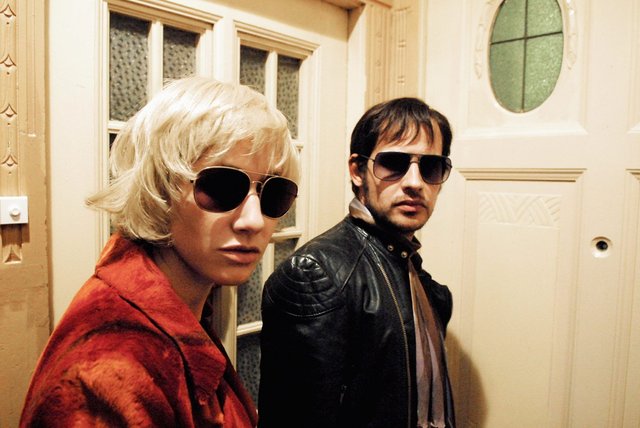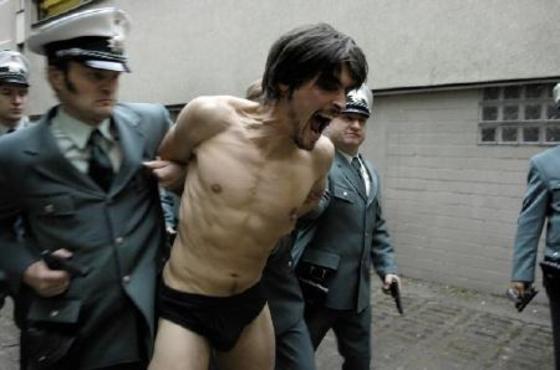
Movie Review: Baader-Meinhof Complex
From 1967 to 1977, a clutch of hardened former student protesters, led by an earnest journalist (Ulrike Meinhof), a charismatic thug (Andreas Baader) and a blonde ministers daughter (Gudrun Ensslin) held Germany hostage with bombings and assassinations.
In faux-military bombast, they called themselves the Red Army Faction (RAF). Everyone else called them the Baader-Meinhof Gang.
Baader-Meinhof and company never ruled anything but a kernel of ardent supporters, but they learned early that the press would seize on anything they said, as long as an act of violence accompanied it. Things ended with a bang – Meinhof hanged herself in May 1976. Baader and Ensslin killed themselves in prison in October 1977, after a Lufthansa jet full of German tourists, hijacked by Palestinians to win Palestinian freedom, was stormed by German commandos. RAF minions in Europe then responded by executing the kidnapped head of the countrys employers association, Hanns Martin Schleyer.
The epic Baader-Meinhof Complex, last years German nominee for Best Foreign Language Picture (and a hit in Germany), journeys from group sex to group suicide, from mass student protests to would-be martyrdom. Its a technically dazzling period drama that still wont make you want to turn the clock back.

Stipe Erceg as Holger Meins in The Baader Meinhof Complex (2008)
Directed by Uli Edel (Last Exit to Brooklyn, Body of Evidence) and produced by Bernd Eichinger (Fantastic Four, Downfall), the unabashedly commercial film wraps action and violence around a solid, sometimes heavy, moral core. Its seductive characters are not likeable in any Hollywood sense. Its ending is no secret. Its protagonists, who staged their deaths as martyrs, are shown to be anything but that.
Based on a thorough history by Stefan Aust, former editor of German newsweekly Der Spiegel, the film tracks the tiny group in student communes and then on the run in their stolen car of choice, the BMW, nicknamed the Baader-Meinhof Wagen. We watch the prisoners make a circus of their eventual trial and drift toward self-destruction as their allies kidnap and kill, finally convincing hard-line Palestinians to hijack a planeload of German tourists on their way from Mallorca to Frankfurt.
Bombings and suicide invite parallels between terrorism then and now. The RAF denounced America and Israel and targeted US bases in Germany. Their suicide fixation did not involve killing themselves in bombings, Stefan Aust stressed in an interview, “but they were talking about turning their bodies into weapons.” (German police stopped some of the worst planned bombings from happening.) While on prison hunger strikes, the radicals quoted a Bertolt Brecht character from his play, “The Measures Taken”, who declared: “We will kill not only others. We will kill ourselves, too, if necessary, for the this murderous world can be changed by force alone.”
“Look at the manifestos of Al Qaeda today, if you take all the religious phrases out, then you have a manifesto that is very similar to what these Left Wing socialist terrorists of the 1970s were saying and writing,” Aust said.
The flat-footed German government fueled the tele-genic radicals celebrity and the countrys paranoia with millions of movie-style posters of 15 wanted criminals who looked like a mix of stoners and kids next door – a composite of German youth.
(Living in Germany then, I was thought to resemble one of them and, like many young Germans, I learned how thorough and frequent police searches could be.)
Nothing if not camera-ready, the RAF have been exhumed and reburied in plenty of films, few of which traveled well beyond Germany. In 1978, filmmakers from the German New Wave made Germany in Autumn, a collage of meditative short films that blamed German culture and the German state for the radicals deaths. Just as mournful was Gerhard Richters series of blurry paintings inspired by photographs of the dead prisoners, which the MoMA bought for $3 million in 1995. The 2002 thriller Baader looked like an extended Ray Ban commercial.
“Everybody was always talking about what terrorism means, not what it is,” said Aust.
Violence drives this new reality check with a dream team cast of German stars – Moritz Bleibtreu of Run Lola Run as Baader, Martina Gedeck of The Lives of Others as Meinhof, Johanna Wohalek of the upcoming North Face as the chillingly moralistic Ensslin, and Brun Ganz as the police official who gets inside their heads.
Romantic rebellion was the RAFs appeal, but romance faded as the body count rose. That realism ensures that the movie isnt Hair, nor is it Easy Rider, or even Bonnie and Clyde.
Nor is it Inglourious Basterds. Theres no rewriting of history, no claim in The Baader-Meinhof Complex that the RAF ever won anything but publicity. At the end, it was their own private Jonestown.
Yet the film has some humor. The group flees to Palestinian training camps in Jordan in 1970, where RAF women sunbathe nude as a smirking cocksure Baader displays his tin ear for other cultures. “Shooting and fucking are the same thing,” he tells a crowd of Palestinian guerrillas. More phallocrat than democrat, he called his female comrades “cunts.”
The RAFs special claim, amid its diatribes against “zionism,” was vengeance against the German government for Nazi crimes. “Theyre re-enacting the resistance that their parents did not do – you give yourself the permission to do anything, because youre always on the right side,” said Aust. “This is the main reason why terrorism in Germany became so cruel.”
The RAF had their own special super-max, a floor where they were confined together in Stammheim, a Stuttgart prison. “Stammheim was not Guantanamo,” stresses Aust. “We put the people on trial and it was a fair trial – more or less, at least. And we didnt throw our juridical and moral standards overboard at that time.”
And the Baader-Meinhof Complex is not an American movie. Charisma and mythology take a back seat to history. Critics will whine, “But I dont care about these characters.” You may end up grateful that a page in history has been turned.
